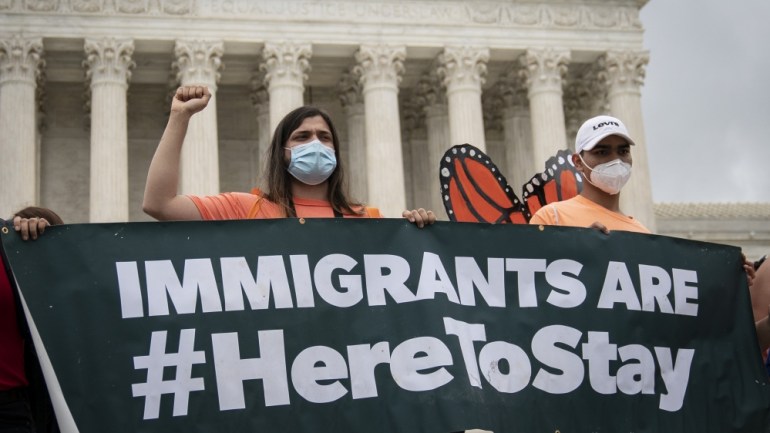Biden, Dems unveil sweeping immigration reform legislation
The major overhaul would create an eight-year pathway to citizenship for an estimated 11 million undocumented people.

US President Joe Biden’s administration is joining Democrats on Capitol Hill on a major immigration overhaul that would offer an eight-year pathway to citizenship to the estimated 11 million people living in the United States without legal status.
The legislation unveiled Thursday will reflect the broad priorities for immigration reform that Biden laid out on his first day in office, including an increase in visas, funding to process asylum applications and new technology at the southern border.
Keep reading
list of 3 itemsBiden homeland security secretary Alejandro Mayorkas confirmed
Biden set to accept more refugees after years of Trump cuts
But while the plan offers one of the fastest pathways to citizenship of any proposed measure in recent years, it does so without offering any enhanced border security, which past immigration negotiations have used as a way to win Republican votes. Without enhanced security, it faces tough odds in a closely-divided Congress.
The bill would immediately provide green cards to farm workers, those with temporary protected status and young people who arrived in the US undocumented as children. For others living in the US as of January 1, 2021, the plan establishes a five-year path to temporary legal status, if they pass background checks, pay taxes and fulfil other basic requirements. Then, after three years, they can pursue citizenship.
The plan would raise the current per-country caps for family and employment-based immigrant visas. It would eliminate the penalty barring those immigrants who live in the US without authorisation and who then leave the country from returning for three to 10 years. It also would provide resources for more judges, support staff and technology to address the backlog in processing asylum seekers.

The bill would expand transnational anti-drug task forces in Central America and would enhance technology at the border. And it would try to reduce the burden at the border by setting up refugee processing in Central America, aiming to prevent some of the immigrant caravans that have overwhelmed border security in recent years.
The plan includes $4bn spread over four years to boost economic development and tackle corruption in Latin American countries, in an effort to address some of the root causes of migration to the US.
Open to piecemeal approach
A dozen Democratic lawmakers, including lead sponsors California Representative Linda Sanchez and New Jersey Senator Bob Menendez, unveiled the full text of the bill Thursday.
Comprehensive immigration reform has struggled to gain traction in Congress for decades.
Menendez was part of the bipartisan Gang of Eight senators who negotiated a 2013 immigration reform bill that ultimately collapsed. Prior to that, a bill backed by President George W Bush failed in Congress as well, after multiple attempts at compromise.
While Biden is pushing a comprehensive bill, he suggested earlier this week that he may be open to a more piecemeal approach.
During a CNN town hall Tuesday night, Biden said that while a pathway to citizenship would be essential in any immigration bill, “there’s things I would deal by itself”. That could leave the door open to standalone bills focused on providing a pathway to citizenship for various populations.
Congressional Democrats are not talking all-or-nothing either.
“Even though I support full, comprehensive immigration reform, I’m ready to move on piecemeal, because I don’t want to end up with good intentions on my hands and not have anything,” said Texas Rep. Henry Cuellar. “I’d rather have progress.”
The pragmatic approach is a clear recognition of the past failures to deliver on a large-scale immigration overhaul — and how success could be even more difficult in a highly polarized, closely divided Congress.
Still, publicly the White House is emphasising that its goal is a comprehensive plan.
“The president feels that all of these requirements that are in the bill – these components of the bill – are what makes it comprehensive,” White House press secretary Jen Psaki said this week. “They all need to be addressed. That’s why he proposed them together.”